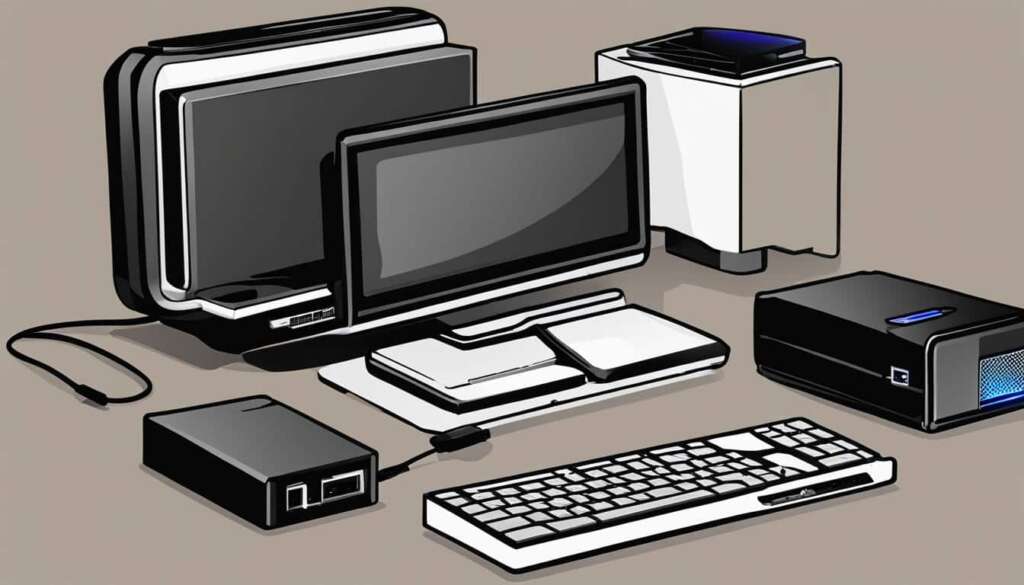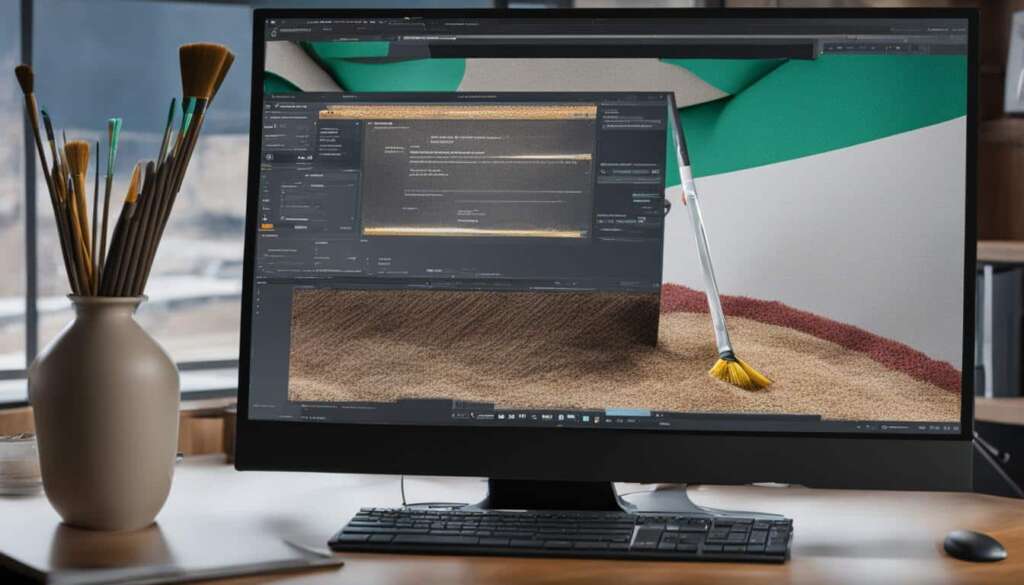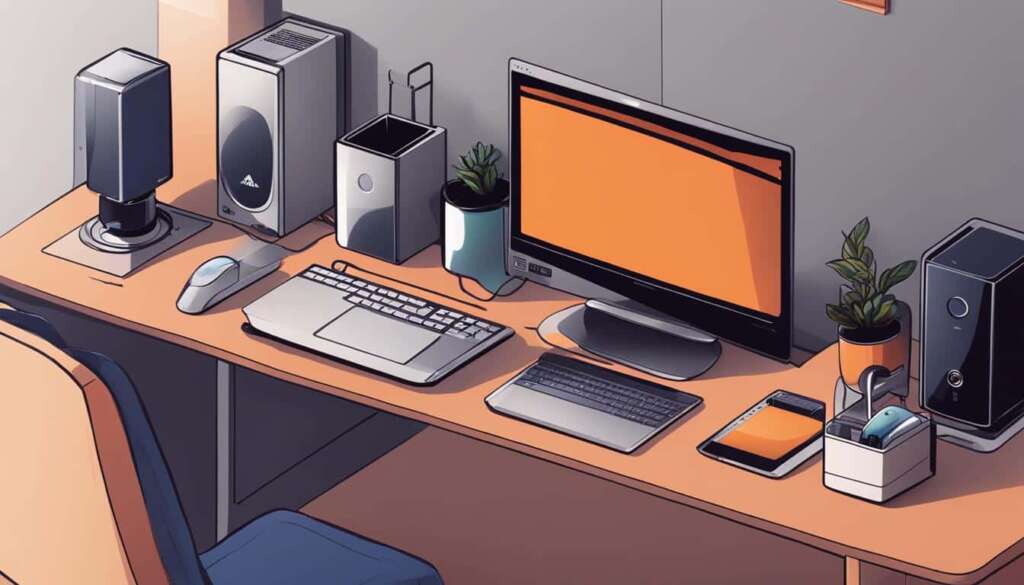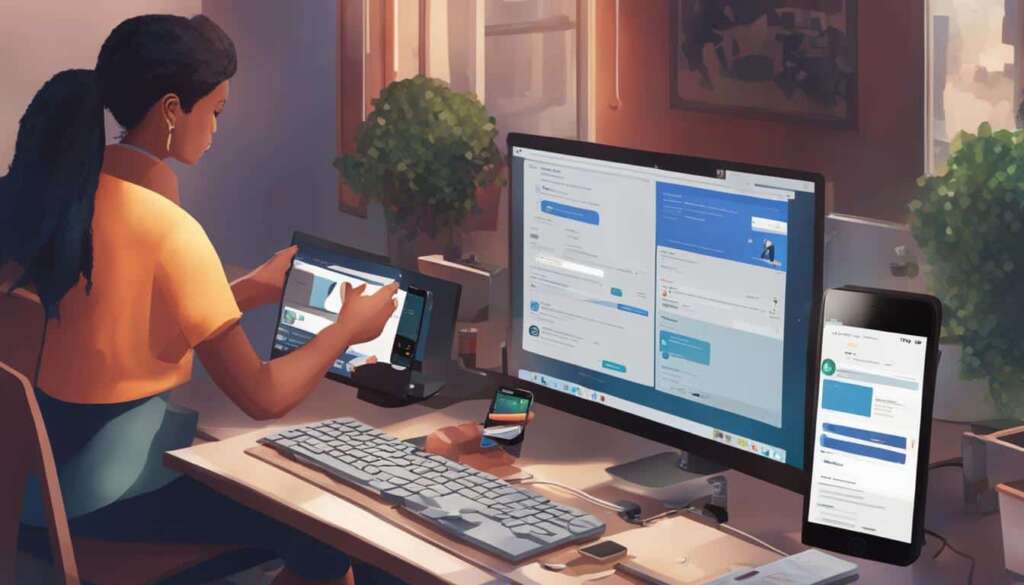Table of Contents
Mini PCs have become increasingly popular in the world of technology. These compact computing devices offer a range of features and capabilities that make them a versatile option for various applications. In this article, we will delve into the background and history of mini PCs, exploring their evolution and emergence in the tech industry.
The concept of mini PCs can be traced back to the development of minicomputers in the 1960s and 1970s. The first minicomputer, the PDP-8, was introduced by DEC in 1965. This groundbreaking innovation paved the way for smaller and more affordable computers, eventually leading to the creation of mini PCs.
Mini PCs, also known as minicomputers or mid-range computers, are characterized by their compact physical size. Despite their smaller form factor, these devices possess most of the features and capabilities of regular computers and laptops. They are equipped with a central processing unit (CPU), memory, storage, operating system, and computer ports.
Mini PCs often utilize ARM-based processors, which are small and energy-efficient. Their storage is typically flash memory-based, and they support various operating systems. It is worth noting that mini PCs may lack a cooling system and real-time clock, and may require additional peripherals such as a display, keyboard, and mouse.
There are several advantages to choosing a mini PC. Their small size makes them highly portable and easy to tuck away in any workspace. Additionally, mini PCs are more cost-effective compared to traditional desktop computers and laptops. They offer versatility, allowing users to customize and upgrade the components to suit their specific needs. Moreover, mini PCs are renowned for their lower energy consumption, making them more energy-efficient.
In conclusion, mini PCs have revolutionized the world of computing with their compact size, powerful features, and affordability. Stay tuned for the upcoming sections of this article, where we will delve deeper into the overview, features, advantages, and considerations of mini PCs.
Overview and Features of Mini PCs
Mini PCs provide compact computing solutions with a comprehensive range of features and components. Despite their small size, they function similarly to regular computers, consisting of a central processing unit (CPU) and memory. Let’s take a closer look at the various parts and unique features that make mini PCs stand out.
Basic Parts and Components
A mini PC encompasses all the essential parts found in a conventional computer. These include:
- Processor: Mini PCs often utilize ARM-based processors, renowned for their compact size and energy efficiency.
- Memory: Mini PCs have built-in memory, allowing for efficient multitasking and quick data access.
- Storage: Instead of traditional hard drives, mini PCs employ flash memory, which ensures faster boot times and reliable storage performance.
- Operating System: Mini PCs support a variety of operating systems, such as Windows, macOS, and Linux, providing users with flexibility and compatibility.
- Ports: Despite their small form factor, mini PCs are equipped with a range of ports, including USB, HDMI, and Ethernet, allowing for seamless connectivity with peripherals.
Unique Features and Considerations
Although mini PCs share the same basic components as larger computers, there are some notable differences and considerations to keep in mind:
“Mini PCs often lack a built-in cooling system and real-time clock, which can impact their performance and functionality. Additionally, mini PCs may require additional peripherals like a display, keyboard, and mouse, as they are not included in the base unit.”
Despite these differences, mini PCs offer a range of advantages, such as their compact size, cost-effectiveness, versatility, and energy efficiency. Their small form factor makes them highly portable and easily fits into limited spaces. Mini PCs are generally more affordable in comparison to traditional desktop computers and laptops. Moreover, they allow users to customize and upgrade components according to their specific needs and requirements. They also consume less energy, reducing overall power consumption.
Whether for home use, office setups, or digital signage purposes, mini PCs offer a reliable and efficient computing solution in a compact package.
| Advantages of Mini PCs | Considerations for Mini PCs |
|---|---|
| Compact size | Lack of cooling system |
| Cost-effective | Lack of real-time clock |
| Versatility | Additional peripherals may be required |
| Energy-efficient |
Stay tuned for the next section, where we will explore the advantages and considerations of mini PCs in greater detail.
Advantages and Considerations of Mini PCs
When it comes to computing, mini PCs offer several advantages that make them an attractive option for many users. Firstly, their compact size is a major benefit. Mini PCs are portable and can easily be tucked away, saving valuable desk space. Whether you need a computer for work, school, or entertainment, the smaller footprint of a mini PC allows for maximum convenience.
Another advantage of mini PCs is their cost-effectiveness. Compared to traditional desktop computers and laptops, mini PCs tend to be more affordable. They offer a budget-friendly alternative without compromising on performance. For those looking for a capable computing solution without breaking the bank, mini PCs are the way to go.
One of the remarkable features of mini PCs is their versatility. They allow users to customize and upgrade various components, such as the memory and storage, to suit their specific needs. This flexibility ensures that your mini PC can adapt to your changing requirements over time, making it a smart long-term investment.
In addition to their size, cost-effectiveness, and versatility, mini PCs are also known for their energy efficiency. These compact devices consume less power compared to their larger counterparts. With increasing concerns about energy consumption and sustainability, mini PCs are an environmentally-friendly choice that helps reduce your carbon footprint.
While mini PCs offer numerous advantages, it’s important to consider some factors before making a purchase. Firstly, their small form factor may limit expandability options. If you require extensive storage or wish to use multiple peripherals simultaneously, it’s essential to ensure that the mini PC you choose can accommodate your needs. Additionally, some mini PCs may have limitations in terms of graphics capabilities, which may impact intensive tasks like gaming or graphic design.
In conclusion, mini PCs bring numerous benefits, including their small size, cost-effectiveness, versatility, and energy efficiency. These compact devices offer a convenient and affordable computing solution without compromising on performance. However, it’s crucial to consider your specific requirements and potential limitations related to expandability and graphics capabilities before making a decision. So, when it comes to choosing the right computer, the advantages and considerations of mini PCs make them a compelling option to explore.
FAQ
What is a mini PC?
A mini PC, also known as a minicomputer or mid-range computer, is a smaller computer that possesses most of the features and capabilities of a regular computer or laptop.
How do mini PCs function?
Mini PCs function similarly to regular computers, consisting of a central processing unit (CPU) and memory. They have the same basic parts as a computer, including a processor, memory, storage, operating system, and computer ports.
What are the differences between mini PCs and regular computers?
Mini PCs often use ARM-based processors, which are small and energy-efficient. They use flash memory for storage and support various operating systems. Mini PCs may lack a cooling system and real-time clock, and may require additional peripherals such as a display, keyboard, and mouse.
What are the advantages of using a mini PC?
Mini PCs have several advantages. Firstly, their small size makes them portable and easy to tuck away. They are also more cost-effective compared to desktop computers and laptops. Mini PCs offer versatility, as they allow users to customize and upgrade the parts. Additionally, they have lower energy consumption, making them more energy-efficient.













